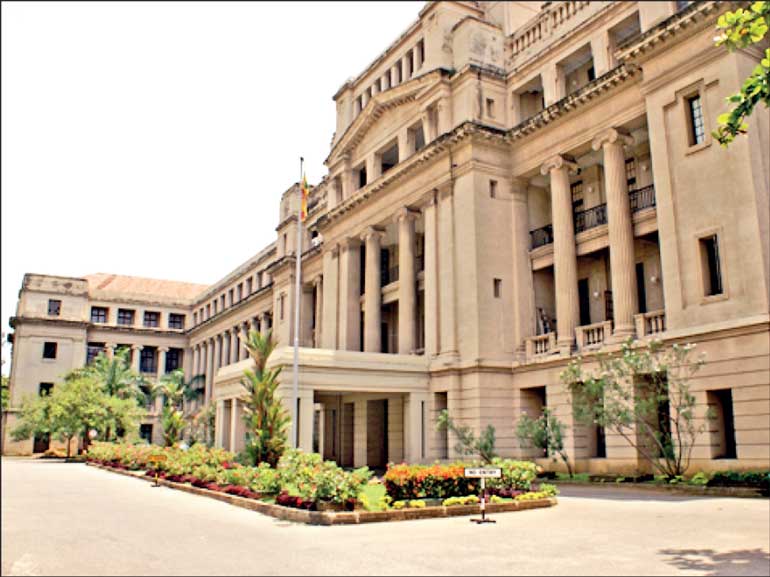Monday Feb 16, 2026
Monday Feb 16, 2026
Tuesday, 5 March 2024 00:10 - - {{hitsCtrl.values.hits}}
 Reforms lack the necessary legitimacy to garner widespread support and effectively address the challenges at hand
Reforms lack the necessary legitimacy to garner widespread support and effectively address the challenges at hand

When unveiling the tax reform leakages and systematic issues, it is evident that the journey towards meaningful tax reform is far from over. When leakages and systematic issues persist within a taxation system, the legitimacy of any proposed reforms becomes questionable. Such deficiencies undermine the fundamental principles of fairness, transparency, and equity that should underscore any tax system. When taxpayers witness leakages and systematic flaws, they lose faith in the system’s ability to uphold their interests fairly

Sri Lanka finds itself entrenched in the throes of an economic crisis, exacerbated by the weight of previous fiscal decisions. Since independence, patrimonial Sri Lankan state has been fostering a culture where citizens expect State benevolence rather than enjoying their rights as tax-paying citizens. Under such a State-society relationship, the intricate interplay between fiscal policies and economic dynamics remains largely obscured. Therefore, poor tax illiteracy amongst the citizens as well as the policy makers is not something to be surprised about.
Perhaps this explains the short-sighted populist decision of the former President Gotabaya Rajapaksa to introduce significant tax cuts as soon as he assumed the office. His stupidity cost the nation dearly and the Government lost more than $ 1.4 billion a year in revenues due to this decision. Tax revenue as a percentage of GDP reduced from 8.1% in 2020 to 7.7% in 2021. The number of taxpayers dropped by a million between 2020 and 2022.
The tax discourse is back on agenda again, perhaps at an intensity it has never reached before. The IMF that came to rescue Sri Lanka’s bankrupt economy recommended that the country should place the tax regime in place as part of its economic reform package. President Wickremesinghe, who promised to turn around the economy, promptly and faithfully took the initiatives to implement the tax reforms. The logic of IMF is simple. The current unhealthy balance sheet deficit cannot address without increasing the income of the Government. The tax income is one of the main income sources for any Government. Therefore, the proposal to establish efficient tax policy is understandable.
Falling in line with the recommendations of the IMF, the Government has undertaken a series of decisive actions to streamline an efficient tax policy. The Government reformed the policy of direct as well as indirect taxes. In direct taxation, individuals pay as s/he earns. In developed economies, the State places greater emphasis on direct taxation as it is perceived as fairer for those with lower incomes. However, with indirect taxation, individuals pay taxes based on consumption, which is often perceived as less fair. Despite criticisms surrounding indirect taxation, the Government has opted to raise them in its recent fiscal measures.
On 1 January 2024, the VAT rate on applicable goods and services increased from 15% to 18%. This amendment brought 97 previously VAT-exempt goods and services under the tax umbrella. On the same day, the Government announced mandatory income tax registration for everyone above the age of 18, of which failure would result in the imposition of a penalty not exceeding Rs. 50,000. However, despite the Government’s swift implementation of sweeping tax reforms, subsequent reflection revealed a sobering truth: a deficiency in capacity hindered efficient execution. Leakages and systemic issues threaten to undermine the efficacy of these policies, casting a shadow over their potential to deliver the much-needed respite. In this article, I would like to discuss the practicality and the efficacy of the new tax reforms instead of the merits and demerits.
Expansion of the tax bases
The Government affirms its dedication to boosting tax efficiency by strategically embracing digital technologies. Acknowledging the transformative impact of digitisation, this effort seeks to streamline tax procedures, enhance compliance, and bolster the efficiency of the tax administration system. This initiative not only demonstrates a commitment to modernising financial procedures but also highlights the Government’s commitment to fostering transparency, reducing compliance obstacles, and maximising resource allocation to support ongoing economic development.
This step towards digitalisation has been recognised as a measure that could minimise the level of corruption that currently exists as it would reduce the interaction between the tax payers and the tax officers. However, the distressed individuals that rush to the Inland Revenue Department to clarify the new tax reforms reveal a different outcome than expected. There can be two potential explanations for the challenges people may be experiencing. Firstly, some individuals may be encountering technical difficulties stemming from a lack of familiarity or capability with technology, making it difficult for them to resolve issues independently. Alternatively, there might be a lack of willingness among the public to adapt to the new technology, resulting in resistance or reluctance to engage with it effectively.
There is divided opinion among the tax officials who are supposed to assist the process. They hold contrasting opinions regarding the RAMIS software that the IRD is relying on to digitalise the tax collection. One group of officials are of the opinion that the software has proven to be a failure and hence metaphorically refer to it as a ‘white elephant’. They claim that the RAMIS system has been developed before the new tax policies and the system is developed in a way that it cannot accommodate amendments to it; hence it has become redundant in the current context.
How the software is handled is also subjected to criticism as those who handle the software do not have the capacity to extract only the necessary data and enter into the system but instead, unnecessarily lengthy documents are scanned and entered which also adds up to the manual labour. Whereas other group of tax officials disagree with the criticism of the previous group and according to them RAMIS was introduced in 2016 but the tax policies changed in 2017 and the system needed amendments.
There have been delays in obtaining payment approvals from the government, attributed to various issues such as the ongoing pandemic situation and inadequate foreign exchange reserves. These delays have hindered our ability to proceed with the necessary updates and amendments in a timely manner. These narratives from the different departments and different groups and the blame game between them not only highlights the challenges with the technology but also the inter and intra-departmental disagreements when implementing the reforms.
Intra-governmental co-ordination
There are challenges when coordinating with different departments towards implementation of the new tax reforms. The new tax reforms anticipate inter-departmental collaboration to ensure comprehensive recording and taxation of all transactions. However, each department has its own set of rules, regulations, and priorities, therefore, coordination is extremely difficult when dealing with entities that operate across multiple jurisdictions. The departments that are expected to merge their information/ data under the current reforms handle sensitive financial and personal information. Therefore, officials have concerns related to privacy, data security, and confidentiality which restricts them from sharing information, thus hindering collaborative efforts. In addition, the decades-old practice of working independently have posed a great challenge to transforming the various departments to share their information with other departments. Not only the distinct work cultures but also the existing infrastructures and processes will undermine the collaborative endeavours.
Conclusion
When unveiling the tax reform leakages and systematic issues, it is evident that the journey towards meaningful tax reform is far from over. When leakages and systematic issues persist within a taxation system, the legitimacy of any proposed reforms becomes questionable. Such deficiencies undermine the fundamental principles of fairness, transparency, and equity that should underscore any tax system. When taxpayers witness leakages and systematic flaws, they lose faith in the system’s ability to uphold their interests fairly. Consequently, any reform efforts are met with scepticism and resistance, as the public questions the efficacy and integrity of proposed changes. Without addressing these underlying issues, reforms lack the necessary legitimacy to garner widespread support and effectively address the challenges at hand.
(The writer is a Researcher at the Social Scientists’ Association, Colombo.)